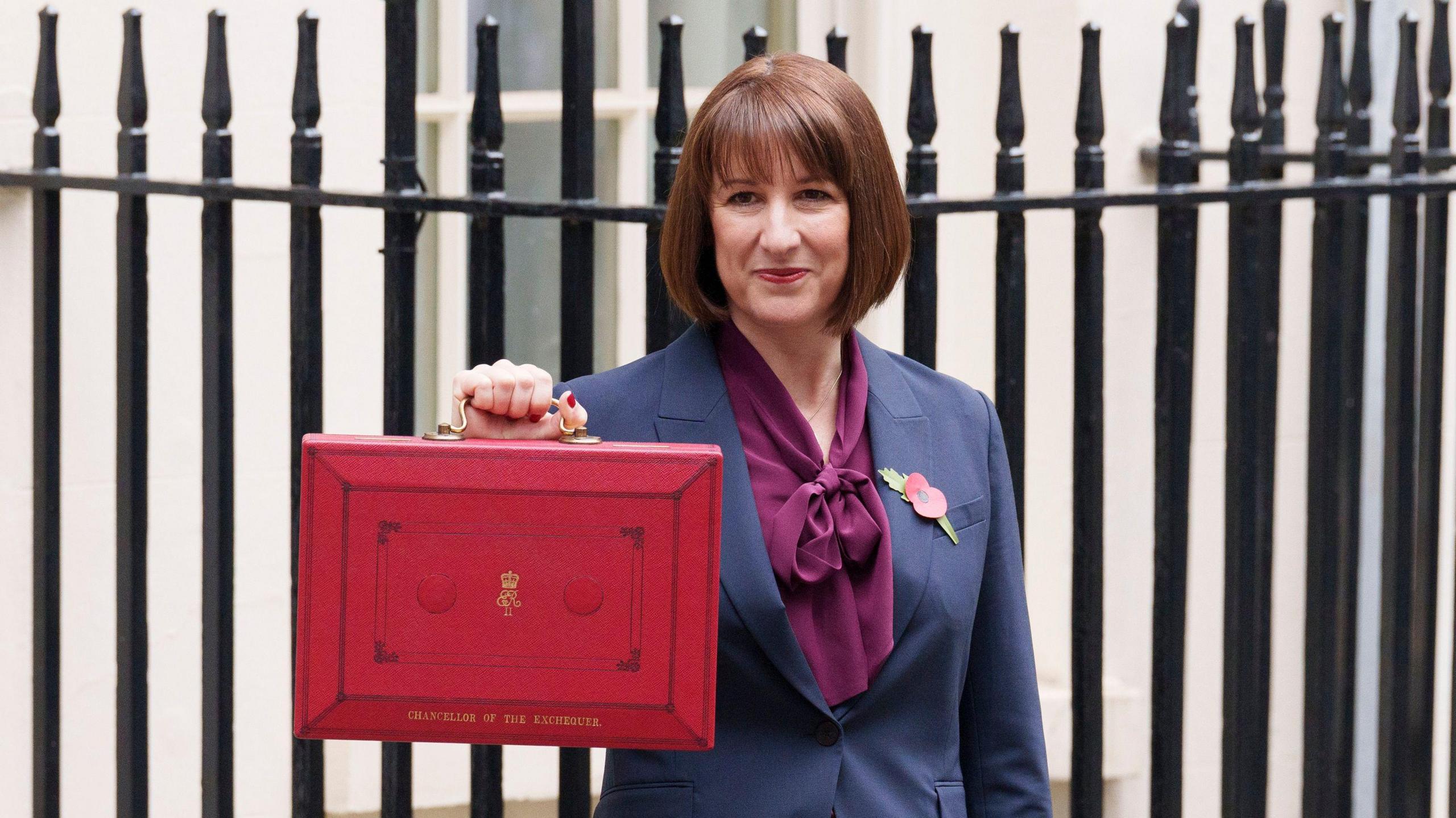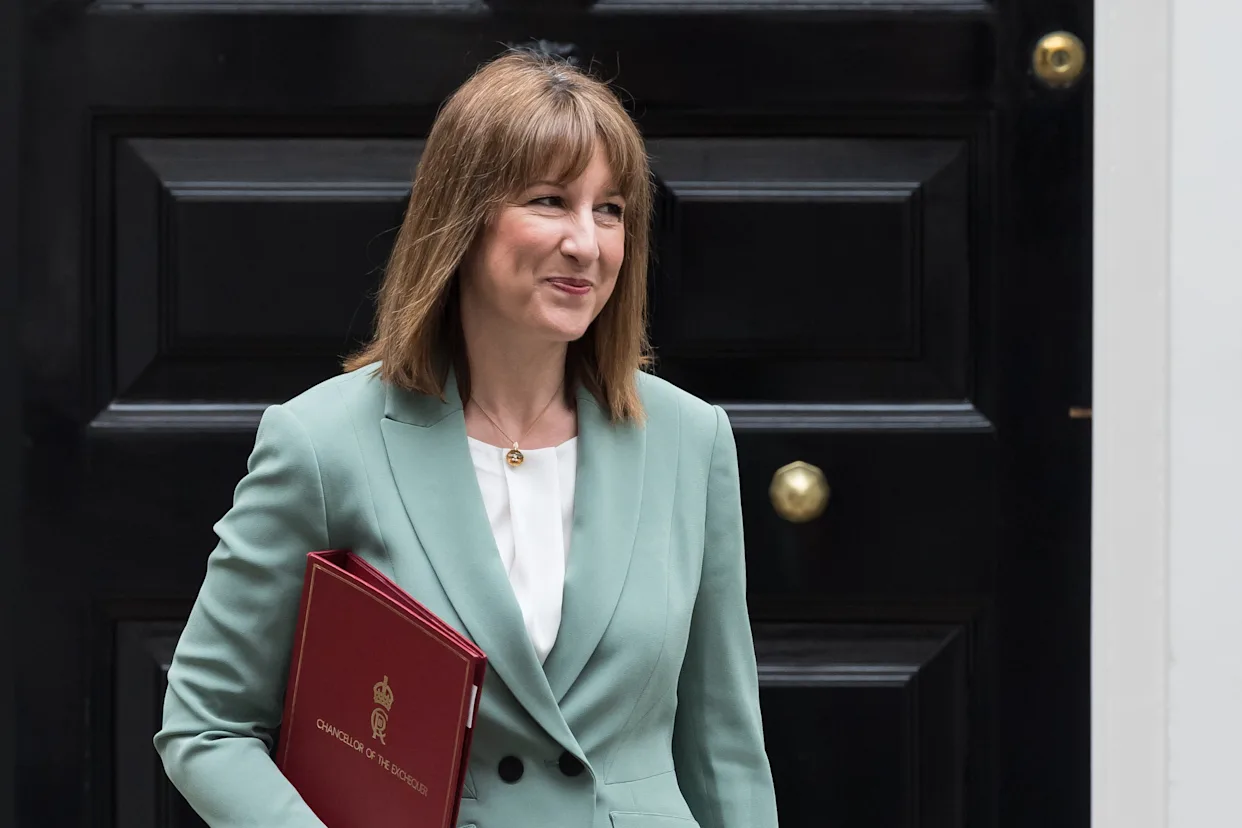Reeves' Tax Crackdown Looms: Exit Fees and Mansion Levies Target UK's Wealthy in 2025 Budget
Rachel Reeves grapples with a £20-35 billion shortfall as her November 26 Budget nears, and Treasury leaks today spotlight two wealth-focused measures under active review. A proposed 20% exit tax on assets for high earners moving abroad pairs with a potential mansion tax on homes over £2 million, aiming to generate billions without altering core income tax bands according to Bloomberg. These ideas, detailed in fresh Whitehall briefings, test Labour's manifesto boundaries while eyeing G7 norms on capital flight.
Details surfaced via Guardian reporting this week, with officials modeling impacts to fund public priorities amid downgraded productivity forecasts. The proposals gain urgency after October's OBR revisions, which widened the fiscal gap by £20 billion alone.

Chancellor Rachel Reeves pictured with the iconic red Budget Box outside Downing Street, as speculation grows over a potential tax rises in the Autumn Budget
Exit Tax on the Table: A Goodbye Bill for Asset-Rich Expats
The exit tax would impose a 20% charge on unrealized gains from UK business assets – such as shares or stakes – when individuals shift tax residency overseas. This closes a current gap where expats avoid capital gains tax by selling post-departure, potentially yielding £2 billion yearly to match practices in France, Germany, and other G7 nations.
James Smith, research director at the Resolution Foundation, explained the rationale in today's Guardian analysis. "The idea would be that if someone decides to leave the country and relocate to a low-tax jurisdiction, they would have to pay tax on any asset gains, like shareholdings, that remained in the UK." Smith noted the risk: early signals could spur preemptive asset shifts or relocations, diluting revenues before launch.
France's 2015 exit tax rollout sparked legal challenges and adjustments, highlighting how such levies can prompt expatriate planning tweaks without a full exodus.
Mansion Tax Makes a Comeback: Annual Hits for Prime Properties
The mansion tax revives a 2012 Liberal Democrat concept, layering extra council tax on residences above £2-3 million – perhaps £10,000 yearly for the top tier, equating to 1% of excess value. Treasury estimates suggest £1-2 billion in annual take, affecting around 300,000 high-end homes based on current market data.
Opposition mounted swiftly. Former Bank of England Governor Lord Mervyn King dismissed the approach in a Times interview last week as "incoherent," adding: "You don't solve that problem by just adding another wealth tax to it." He argued it lacks strategic depth, potentially freezing markets and curbing owner mobility.
Scotland's 2017 Land and Buildings Transaction Tax hikes showed early revenue shortfalls of up to 30% due to deferred deals, a cautionary parallel for UK-wide rollout.
Balancing Act: Fiscal Pressures Meet Political Pledges
Reeves navigates tight constraints from Labour's pledges against raising income tax, national insurance, or VAT rates – and steering clear of fresh stealth taxes on wealth. Yet the inherited "black hole," now compounded by OBR's £20 billion productivity cut, demands creative revenue hunts. A recent YouGov survey found 75% public backing for taxing the super-rich more, offering Reeves political cover if middle earners stay untouched.
Asset Squeeze Alert: How Exit and Mansion Taxes Could Reshape Your Finances
Exit and mansion taxes pivot taxation toward "locked" wealth – gains on paper from investments or the equity in your home – rather than daily earnings. The exit version deems a "virtual sale" of assets upon leaving the UK, capturing deferred taxes at 20%; the mansion levy adds a recurring fee on property values, much like an upscale council tax band.
For homeowners eyeing that £2 million threshold or professionals mulling overseas roles, the fallout feels personal. Extra £5,000-£10,000 annual property costs could trim renovation budgets or holiday funds, while exit rules might shave 10-15% off net relocation gains, per Deloitte estimates. Broader ripples? Stagnant high-end sales could slow construction jobs and related spending, nudging up everyday mortgage rates by 0.2-0.5% if investor sentiment sours.
According to analysis reviewed by Finance Monthly, behavioral responses often erode 20-40% of projected yields – as in a 2023 HMRC trial where an exit tax prototype forfeited £800 million to advance planning. One anonymized family with £3 million in London assets deferred a downsizing in 2024 amid tax fears, locking £15,000 yearly in untapped equity that could have funded education fees.
Insight from the Institute for Fiscal Studies: Bundling these with targeted inheritance tax relief on family homes could boost net gains by £4 billion, minimizing flight. For you, act now: If your property nears £1.5 million, grab a free valuation via Zoopla this month – it spots banding risks and qualifies for £1,000+ energy grants to offset levies. Global job seekers, track your 2025 residency days with HMRC's online tool; dipping below 90 in the UK year avoids full exit triggers, saving up to 15% on asset taxes per recent models.

Chancellor Rachel Reeves outlines plans to increase taxes in the November Budget.
Hot Searches: What You're Asking About Reeves' Tax Plans
What Is the UK's Proposed Exit Tax for 2025?
A 20% levy on unrealized business asset gains for expats leaving the country, projected to raise £2 billion by aligning with G7 standards – though early leaks risk capital outflows.
How Would a Mansion Tax Affect UK Homeowners in Reeves' Budget?
Homes over £2-3 million could see £5,000-£10,000 extra yearly via council tax hikes, impacting 300,000 properties and potentially cooling sales, echoing Scotland's 2017 tax shortfalls.
What Is Rachel Reeves's Net Worth in 2025?
Chancellor Rachel Reeves commands an estimated £2 million net worth, drawn from her £160,000 salary, pensions, and prior banking roles at HBOS.
| Category | Details |
|---|---|
| Individual | Rachel Reeves, UK Chancellor of the Exchequer |
| Proposal 1: Exit Tax | 20% “settling-up charge” on business assets for individuals leaving the UK; designed to capture capital gains that would otherwise avoid UK CGT. Estimated revenue: £2bn. ([The Guardian](https://www.theguardian.com/politics/2025/nov/01/rachel-reeves-considers-20-tax-on-assets-of-people-deciding-to-leave-uk)) |
| Proposal 2: Mansion Tax | Annual tax on properties above £2m (threshold identical to Liberal Democrats’ 2012 proposal). Could affect ~150,000 properties in England & Wales. ([GB News](https://www.gbnews.com/money/budget-2025-rachel-reeves-mansion-tax-senseless)) |
| Fiscal Context | Reeves faces a fiscal hole of £20-50bn for the November 26 Budget, balancing manifesto promises against revenue needs. ([The Week](https://theweek.com/politics/rachel-reeves-takes-on-the-most-hated-tax?utm_source=chatgpt.com)) |
| Political Debate | Critics warn exit tax may accelerate wealth flight; mansion tax may depress high-end property market and liquidity. Shadow ministers, economists, and former Bank of England officials have voiced concerns. ([The Times](https://www.thetimes.com/uk/politics/article/mansion-tax-idea-is-incoherent-ex-bank-governor-tells-reeves-n8wqjdr0v)) |
| Key Quotes | James Smith, Resolution Foundation: “The idea would be that if someone decides to leave the country and relocate to a low-tax jurisdiction they would have to pay tax on any asset ‘gains’ that remained in the UK.” Lord King, ex-Governor of Bank of England: “Mansion tax proposal is incoherent and risks market distortion.” |
| Affected Groups | - High-net-worth individuals leaving the UK - Owners of properties valued above £2m - Investors, entrepreneurs, and business owners with UK-based assets |
| Potential Revenue | - Exit tax: ~£2bn estimated - Mansion tax: revenue depends on rate and property market response; could contribute toward £20-50bn fiscal gap |
| Financial / Economic Implications | - Could incentivize capital flight and asset relocation - May reduce liquidity in high-end property markets - Signals shift from income-based to wealth and asset taxation - Potential effect on UK’s attractiveness to entrepreneurs and investors |
| Sources | The Guardian, The Times, The Week, Independent UK — reporting on Reeves’ proposed exit and mansion taxes. |














